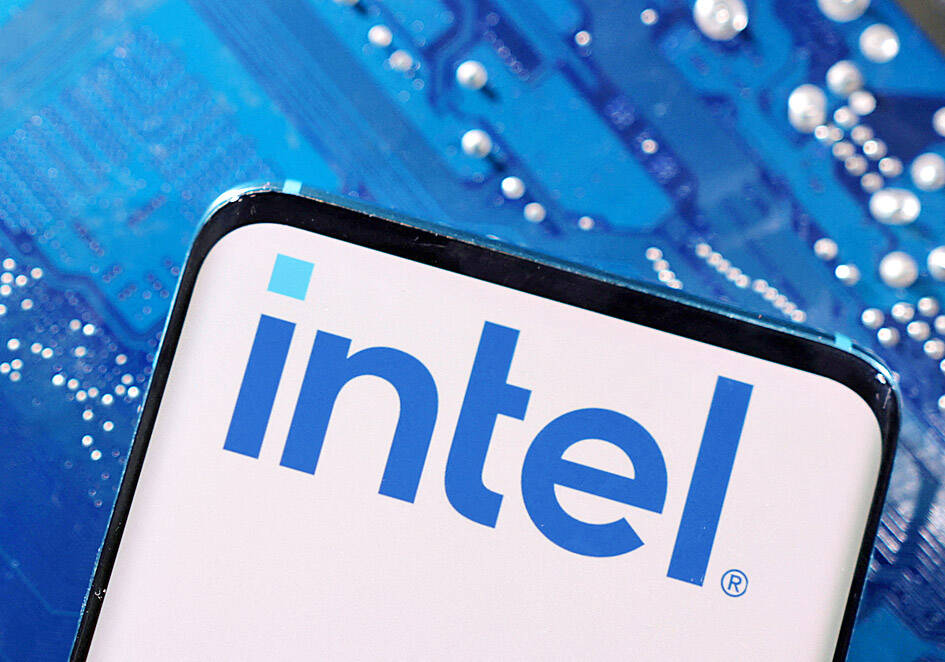Intel Corp is in advanced talks with Apollo Global Management Inc over a deal that would have the investment firm providing more than US$11 billion in funding for a chip manufacturing plant in Ireland, the Wall Street Journal reported yesterday.
The two companies are in exclusive talks and could reach an agreement in the coming weeks, the newspaper said, citing people familiar with the discussions who it didn’t identify.
The potential partnership comes as superpowers around the world earmark hundreds of billions of dollars for companies like Intel to build the next generation of semiconductor manufacturing in their backyards. The US and European Union have led these funding efforts, in part as a means of challenging China for chip dominance but also as a broader effort to lessen their dependency on Asian supplies.

Photo: Reuters
Apollo and Intel declined to comment. Other alternative asset managers in addition to Apollo, including KKR & Co and Stonepeak Partners LLC, had also previously held talks to fund the Intel facility in Ireland, Bloomberg News reported last month.
Intel chief executive officer Pat Gelsinger has been working to diversify the company’s manufacturing operations outside of Asia, which dominates chip production today. He’s also striving to restore the chip pioneer’s technological leadership after companies including Nvidia Corp and Taiwan Semiconductor Manufacturing Co (台積電) eclipsed its capabilities.
As part of Gelsinger’s turnaround efforts, Intel is becoming a so-called foundry — a contract manufacturer that makes chips for other companies. Last month, Intel’s shares tanked after the company said its new foundry division had sales of US$18.9 billion last year, down from US$27.5 billion the previous year, and that operating losses at the new unit had widened. The chipmaker warned at the time that it may not reach a break-even point for several more years.
Intel has already poured billions into chip plants around the world. The company said in December last year that it was investing US$25 billion in Israel after securing US$3.2 billion worth of incentives from the nation’s government. In June last year, it struck a deal with Germany to invest around 30 billion euros (US$32 billion) in semiconductor operations.
A pact with Apollo would follow on a previous transaction in which Brookfield Infrastructure Partners LP agreed to invest as much as US$15 billion for a stake in Intel’s manufacturing expansion in Arizona.

PROTECTION: The investigation, which takes aim at exporters such as Canada, Germany and Brazil, came days after Trump unveiled tariff hikes on steel and aluminum products US President Donald Trump on Saturday ordered a probe into potential tariffs on lumber imports — a move threatening to stoke trade tensions — while also pushing for a domestic supply boost. Trump signed an executive order instructing US Secretary of Commerce Howard Lutnick to begin an investigation “to determine the effects on the national security of imports of timber, lumber and their derivative products.” The study might result in new tariffs being imposed, which would pile on top of existing levies. The investigation takes aim at exporters like Canada, Germany and Brazil, with White House officials earlier accusing these economies of

Taiwan Semiconductor Manufacturing Co (TSMC, 台積電) would not produce its most advanced technologies in the US next year, Minister of Economic Affairs J.W. Kuo (郭智輝) said yesterday. Kuo made the comment during an appearance at the legislature, hours after the chipmaker announced that it would invest an additional US$100 billion to expand its manufacturing operations in the US. Asked by Taiwan People’s Party Legislator-at-large Chang Chi-kai (張啟楷) if TSMC would allow its most advanced technologies, the yet-to-be-released 2-nanometer and 1.6-nanometer processes, to go to the US in the near term, Kuo denied it. TSMC recently opened its first US factory, which produces 4-nanometer

Teleperformance SE, the largest call-center operator in the world, is rolling out an artificial intelligence (AI) system that softens English-speaking Indian workers’ accents in real time in a move the company claims would make them more understandable. The technology, called accent translation, coupled with background noise cancelation, is being deployed in call centers in India, where workers provide customer support to some of Teleperformance’s international clients. The company provides outsourced customer support and content moderation to global companies including Apple Inc, ByteDance Ltd’s (字節跳動) TikTok and Samsung Electronics Co Ltd. “When you have an Indian agent on the line, sometimes it’s hard

‘SACRED MOUNTAIN’: The chipmaker can form joint ventures abroad, except in China, but like other firms, it needs government approval for large investments Taiwan Semiconductor Manufacturing Co (TSMC, 台積電) needs government permission for any overseas joint ventures (JVs), but there are no restrictions on making the most advanced chips overseas other than for China, Minister of Economic Affairs J.W. Kuo (郭智輝) said yesterday. US media have said that TSMC, the world’s largest contract chipmaker and a major supplier to companies such as Apple Inc and Nvidia Corp, has been in talks for a stake in Intel Corp. Neither company has confirmed the talks, but US President Donald Trump has accused Taiwan of taking away the US’ semiconductor business and said he wants the industry back